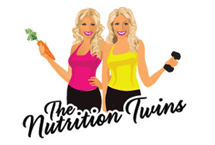As seen on:

Written by The Nutrition Twins
Although many people think that if they simply switch to a vegetarian diet, it will cause them to lose some unwanted pounds, weight loss actually isn’t a given when you toss the meat from your diet. While it makes sense that you would lose weight by cutting out burgers, bacon, sausage, wings and other fatty meats from your regular food intake, many new vegetarians come to see us baffled by weight gain. And how can you blame them, after all, shouldn’t eating more fruits, vegetables and whole grains in lieu of the typical fatty, meat-rich diet save some calories and shed some weight? The answer is yes; however, there are several common mistakes vegetarians make that backfire. Don’t let these happen to you.
Vegetarian Mistake #1: In an effort to avoid meat, you forget to include protein at each meal. Eeks! This is a recipe for hunger and weight gain. Protein helps you to feel satiated and without it you end up feeling hungry every few hours (protein takes 4- 6 hours to digest compared to just 1-4 hours for carbohydrates) and eating more food.
Solution: Include a serving of a non-meat protein at each meal. If you are avoiding all animal products, include options like legumes, hummus, nuts, nut butters, split peas, tofu and lentils. If you are a lacto-ovo vegetarian also try nonfat or low-fat yogurt or other fat free or low-fat dairy products or eggs as a source of protein. Pesca-vegetarians can include fish for protein.
Vegetarian Mistake #2: You eat a food simply because it’s vegetarian and you don’t pay attention to the variety or the quality. If you live on potato chips and soda, or on candy or cakes, you are by definition a vegetarian! You can get a lot of extra calories (and not many nutrients!) from these non-meat foods that are easy to overeat. So you end up missing out on all of the healthy reasons to be a vegetarian—eating more fruits, veggies, whole grains and plant-based protein sources.
Solution: Just as you would if you were eating meat, choose to eat food because it is wholesome, and nutrient-packed, not just because it doesn’t contain animals.
Vegetarian Mistake #3: You fill up on vegetarian meals and assume they are low in calories. Although vegetarian meals may feel light and contain healthy ingredients, they are often surprisingly high in calories, as frequently used ingredients like nuts, seeds, oils or soy cheeses, can pack in calories. We’ve had numerous clients who have come to us because they gained weight while eating seemingly super healthy vegetarian meals (ie vegetarian lasagna, quinoa with vegetables and cashews). Think: 1 cup of steamed kale has 35 calories, but if it’s sautéed in 2 tablespoons of heart healthy olive oil, it suddenly has 275 calories!
Solution: If your food comes in a package, read the label to see the calories per serving just as you would for a non-vegetarian meal. Pay attention to the portion size and whether you think it will fill you. Keep in mind that if you average about 1600 calories daily, as many health conscious females do, about 400 calories per meal is a good goal to shoot for. This will allow two, 200-calorie snacks. If you are dining out and there is no nutrition facts label, do just as you would with a diet that contains meat: fill at least half of your plate with salads and steamed veggies that have been prepared with minimal oil or butter so that they remain very low in calories. Save a smaller portion of the plate for the more calorie-dense portion of the meal (the portions that include oils, nuts and sauces). This way, you’ll still eat the quantity of food that you are used to eating, but you’ll be cutting out a significant source of calories.
For more like this you may like…
For a Get Healthy Guide, check out The Nutrition Twins Veggie Cure


